Colorism: Skin Tone Affecting Job Opportunities
BY: FUNKE A.
Reading time: 3 minutes
Preparing for a job interview entails many things:
Rehearsing answers for potential interview questions
Getting your hair cut or done
Finding the right conservative outfit
Making sure you can reach the interview transportation wise
These are a few of things that everyone thinks about the night before they walk into a room of people that can define their financial fate. But one thing that black women may think about, more than others, is not just their job credentials and what they can bring to the table, but their looks--mostly their skin color.
I know, I know—many people may think this is far fetched, but it’s a real experience that many darker-skinned women have. It is more than rare that a black woman feels that other potential job candidates may get the job just because they have a lighter-skinned complexion and is deemed more attractive, or a white candidate who easily gets the job because he or she is simply white.
According to a 2005 research by Dr. Matthew Harrison, his significant study of 'colorism' in the American workplace indicated that dark-skinned African Americans face a distinct disadvantage when applying for jobs, even if they have superior qualifications and experience to lighter-skinned black applicants.
“Colorism is prejudice or discrimination against individuals with a dark skin tone, typically among people of the same ethnic or racial group.”
Harrison continues to state:
“Our results indicate that there appears to be a skin tone preference in regards to job selection. This finding is possibly due to the common belief that fair-skinned blacks probably have more similarities with whites than do dark-skinned blacks, which in turn makes whites feel more comfortable around them.
In 2010, CNN did a study on that shows the views of skin color by kids. Most of the kids in the video determined the less educated with darker skin color.
Skin Color - The Way Kids See It
Based on some parts of this video, it shows that people can have a foundational understanding of the misconception that darker skinned people are less educated than lighter skinned people, even though there is the broader fact that black women are the most educated in the United States.
Harrison also attributes that “lighter skin is almost universally valued among racial groups”. An example is an Indian commercial that presented an underlying message that lighter skinned people are more favored in job opportunities than darker skinned people.
In this video, it portrays a young woman not getting her dream job after doing four different interviews. Once she lightened her skin, she was able to get the position.
This is a very unfortunate truth that people prefer fair skinned candidates than darker skinned candidates. Did this commercial show some truth? It did. Is it right? No, it’s not. This phenomenon has turned into “that’s just the way it is.”
Confessions of a D Girl: Colorism and Global Standards of Beauty - Chika Okoro
In this video, Chika Okoro presents a great presentation about Colorism.
Okoro ends her presentation with:
“..these beauty preferences that we have, there are not something we are born with, their learned and if their learned, they can be unlearned.
Among us are CEOs, co-founders, and structures of marketing —you all are the arbiters of what society considers beautiful by deciding who you choose on an advertising or who you choose to be the face of your brand. When you have the opportunity to make that choice make the unconventional choice.
Those of us that consume these messages may play a role too, because the first step to change is awareness. And now everyone in this room is a little more aware and will see the world just a little bit differently. And we don’t have to passively accept what society tells us to think is beautiful. We can question it, we could challenge the status quo because when we do we get one step closer to broadening the standard of beauty and create a society where the world can see that D girls are beautiful too.”
As a community, it is imperative that we understand colorism and how it can affect an opportunity for a job, perhaps a great career. If we can all be aware of this phenomenon and how it just not only affects those in Hollywood but regular working people that want to make an honest living, we can change the definition of competence and skills that are not just skin deep, what it means in the workplace and beyond that space.
Hey 💕
Thank you for reading this post. We are an independent company and rely on readers like you to help support us! If you want to continue to support Your Corporate Black Girl, you can do so in a few ways:
Subscribe to us! Yes, it's that simple and easy!
Or, write for us! Share an experience, let us interview you. Let us know you.
Thank you!
Team Your Corporate Black Girl
MORE POSTS LIKE THIS
POPULAR POSTS








